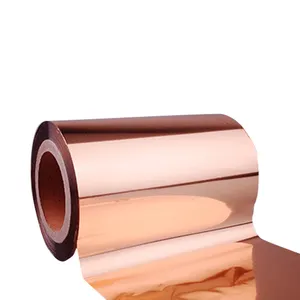In the world of advanced materials and cutting-edge technology, copper has always held a special place. Its remarkable conductivity, ductility, and corrosion resistance have made it a staple in various applications, ranging from electrical components to architectural elements. However, in recent years, a fascinating innovation has emerged – Copper Coated Film. These thin, flexible, and highly versatile films are revolutionizing industries and enabling groundbreaking advancements. In this blog, we will delve into the world of copper coated films, exploring their characteristics, applications, and the impact they are having on various sectors.
Unveiling the Science: What are Copper Coated Films?
Copper coated films are composite materials consisting of a thin layer of copper deposited onto a flexible substrate, typically made of materials like polymers or glass. This unique combination leverages the outstanding properties of copper while retaining the flexibility and lightness of the substrate. The deposition of copper is often achieved through techniques such as physical vapor deposition (PVD) or electroplating, resulting in a uniform and conductive layer that can be as thin as a few micrometers.
Characteristics that Shine
- Conductivity: The standout feature of copper coated films is their exceptional electrical conductivity. This property makes them ideal for applications that require efficient transmission of electrical signals, such as touchscreens, flexible circuits, and antennas.
- Flexibility: Unlike traditional copper sheets, copper coated films are extremely flexible, allowing them to be molded into various shapes and integrated into curved surfaces. This flexibility opens up possibilities in industries like wearable technology and flexible electronics.
- Lightweight: Copper coated films are significantly lighter than solid copper sheets. This attribute is particularly advantageous in applications where weight matters, such as aerospace and automotive industries.
- Corrosion Resistance: The copper layer on these films offers corrosion resistance, protecting the underlying materials from environmental factors and extending the lifespan of the components.
- Thermal Conductivity: Copper is renowned for its excellent thermal conductivity. When used in films, this property can be harnessed for applications in heat management and thermal dissipation.
Applications Across Industries
- Electronics: Copper coated films play a pivotal role in the electronics industry. They are used in flexible printed circuits, RFID antennas, and touchscreens for smartphones, tablets, and other electronic devices.
- Medical Devices: Medical sensors, wearable health monitors, and diagnostic tools are incorporating copper coated films due to their flexibility and biocompatibility.
- Automotive: The lightweight and conductive nature of these films is contributing to the development of lightweight and efficient electronic systems in vehicles.
- Aerospace: Copper coated films are being integrated into spacecraft and satellites for their ability to provide reliable electrical connections in challenging environments.
- Renewable Energy: These films find application in solar panels and energy storage systems, facilitating efficient energy conversion and storage.
- Architecture: Innovations in architectural design are incorporating copper coated films in smart windows, facades, and building-integrated solar panels.
Challenges and Future Prospects
While copper coated films offer an array of benefits, challenges remain in terms of cost-effectiveness, scalability, and long-term durability. Researchers and engineers are actively addressing these issues, exploring new deposition techniques and material combinations to enhance the performance and viability of these films.
Conclusion
Copper coated films are shining examples of how material innovation can drive progress across various industries. Their remarkable combination of conductivity, flexibility, and lightweight properties positions them as a transformative technology with the potential to reshape electronics, healthcare, transportation, and beyond. As research and development efforts continue, we can expect to witness even more exciting applications and advancements fueled by the brilliance of copper coated films.
